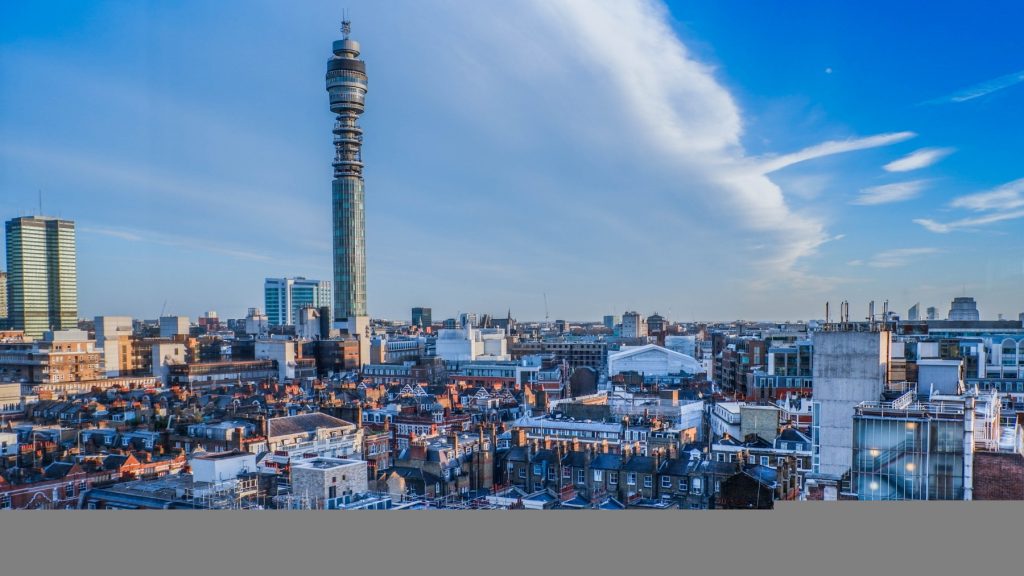
For slightly more than $347 million, American hotel developer MCR Hotels purchased London’s iconic BT Tower from British telecom company BT.
- The 177-meter structure initially served as a hub for long-distance communication.
- Over the years, the tower evolved beyond its original purpose, featuring a revolving restaurant on its 34th floor.
British telecom group BT sold London’s iconic BT Tower to U.S. hotel developer MCR Hotels for a little over $347 million.
The 177-meter structure has been towering over the central Fitzrovia neighborhood since its opening in 1965. It was initially designed to support long-distance communication, handling up to 150,000 telephone conversations and 40 television channels.
Over the years, this symbol of the city’s telecommunications prowess has evolved beyond its original purpose. At one point, the revolving restaurant on its 34th floor, called “The Top of Tower,” became a tourist attraction with high-profile visitors. In 1971, however, the world proved it wasn’t a place for nice things as bombers placed a bomb in the bathroom which detonated causing extensive damage but minimal injuries. Following the attack, security was heightened, but the restaurant ultimately closed for good.
Now, under MCR Hotels ownership, BT Tower will become a luxury hotel. This won’t be the first time the hotelier takes on such historically prominent landmarks. They have previously taken over TWA Hotel at New York’s JFK Airport. They have pledged to preserve the tower’s iconic status while modifying it to serve its new purpose. London-based Heatherwick Studios will handle introducing luxury hotel rooms and their amenities to the renovated structure.
Founder and director of Heatherwick Studio Thomas Heatherwick said “This is an extraordinary building and an amazing opportunity to bring it back to life. We’re excited at the prospect of working with Fitzrovia’s residents and with many thousands of Londoners, to repurpose this important piece of the city’s living heritage.”
No one is really surprised that it has come to this.
The BT Tower’s status and historical significance as THE telecommunications structure in the region has immense heritage value. It was one of the first major concrete-framed structures in the U.K.. For years, it connected the U.K. to the rest of the world. Its distinctive design and prominent position on the London skyline made the city easily recognizable in films, photographs, and artwork. You couldn’t mistake that skyline for another one. It was featured in the climax of V for Vendetta and the backdrop of Doctor Who. It is only natural for tourists to gravitate towards it.
What else are they supposed to do with about 34,000 tons of concrete, wires, metal, glass, and other materials, anyway? They can’t demolish it without risking lives. How do you even go about demolishing a 177-meter-long contemporary, immovable, and solid structure? Do they just start cutting it to pieces from top to bottom and then hauling it down the stairs? Ridiculous! And the tower is perfectly good, still structurally intact, why would they demolish it? Adaptive reuse breathes new life into the aging structure. I’m not saying make a hotel out of the pyramids—that would be criminal and perhaps even blasphemous—but why add to the concrete jungle when you can reuse it?
The sale conserves the heritage, promotes tourism, and brings something new without breaking ground on another land. It all comes down to three things: culture and heritage, tourism money, and sustainability.
Besides, do you have any idea what it would cost to build a BT Tower today? According to Google’s Gemini, “a conservative estimate might range from several hundred million to billions of pounds depending on the chosen approach and desired level of replicability.” At that point, it would be cheaper for them to buy the BT Tower and fix it up rather than break ground on a new project.
The actual surprising part however is the fact that it was a U.S. hotelier who purchased the tower and not a British one. I thought the telecom group would prefer “keeping it in the family.”
It would be ironic if, all of a sudden, the U.K. became as paranoid about the American hotelier as the U.S. is about anything Chinese.
Inside Telecom provides you with an extensive list of content covering all aspects of the tech industry. Keep an eye on our Community section to stay informed and up-to-date with our daily articles.